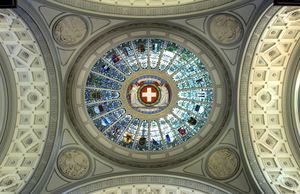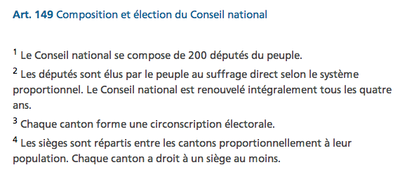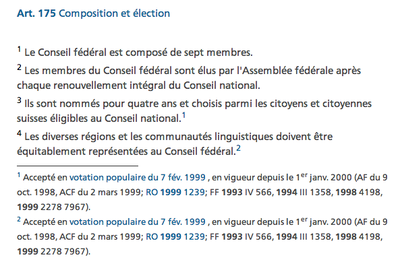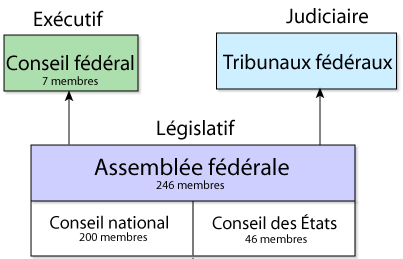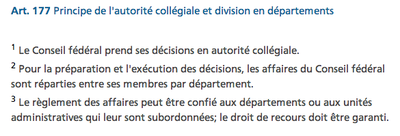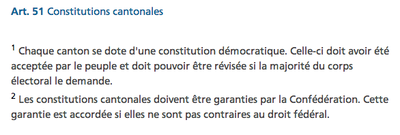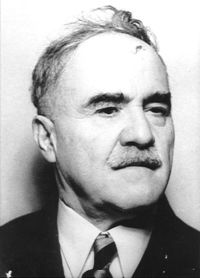Switzerland's state structure, political system and neutrality
Dome of the Federal Palace, with the motto "Unus pro omnibus, omnes pro uno" (one for all, all for one) inscribed in the central part.
| Professeur(s) | Victor Monnier[1][2][3][4][5][6] |
|---|---|
| Cours | Introduction to law |
Lectures
- The definition of law
- The State
- The different branches of law
- The sources of law
- The great formative traditions of law
- The elements of the legal relationship
- The application of law
- The implementation of a law
- The evolution of Switzerland from its origins to the 20th century
- Switzerland's domestic legal framework
- Switzerland's state structure, political system and neutrality
- The evolution of international relations from the end of the 19th century to the middle of the 20th century
- The universal organizations
- European organisations and their relations with Switzerland
- Categories and generations of fundamental rights
- The origins of fundamental rights
- Declarations of rights at the end of the 18th century
- Towards the construction of a universal conception of fundamental rights in the 20th century
The Federal State and the main organs of the Confederation and the Cantons
Historical reminder: the federal state is a compromise. Indeed, the competence of the federal State is not total, because the cantons retain a certain sovereignty. The least worse solution was therefore bicameralism. In addition, there are also elements that weigh change as soon as restructuring takes place: for example, a double majority is required to amend the Constitution.
The progressives wanted the cantons' sovereignty to be abolished; now they are represented by the National Council (the people) and the Federal Council (before 1848, Switzerland had no executive, no Federal Council). The latter also enabled the country to stay on course during the difficulties of the 19th century.
At the federal level
The Federal Assembly
The Federal Assembly, or Federal Parliament, represents the supreme authority of the Confederation composed of two chambers:
- the National Council, which is composed of 200 deputies of the elected people in proportion to the population of the cantons.
- the Council of States is composed of 46 deputies from the cantons.
The two Chambers sit in two different chambers, but they both have the same weight and competence. This perfect parity is called perfect bicameralism.
Members of Parliament have a militia function: this function is not their job. On the other hand, they are not bound by an "imperative mandate", i.e. they are free in the way they vote. In order to carry out their task of representation, Members shall enjoy immunity.
Immunity is a privilege that causes a person, because of a quality of his or her own, to escape a duty, or subjection, that affects others. There are two categories:
- Irresponsibility: immunity by virtue of which the parliamentarian is exempt from any legal action for opinions or votes expressed in the performance of his or her duties.
- Inviolability: protection of the physical and intellectual freedom of parliamentarians as citizens - a member cannot be prosecuted during his or her term of office to avoid interfering with parliamentary debate. It may only be continued with the authorization of the Board of which it is a member.
National Council
Each canton is entitled to at least one seat. The National Council is elected by proportional representation.
Council of States
The method of elections is defined by the cantons. Generally, the system is a two-round majority mode. To exercise certain powers, the Federal Assembly sits and deliberates in a single college.
Not to be confused with the Council of State, the name given to the governments of the French-speaking Swiss cantons: cantonal executive.
The aims and tasks of the Federal Assembly
The Federal Assembly is responsible for all constitutional and foreign affairs revisions (Art. 166 Cst), draws up the budget, approves the accounts, ensures that relations between the Federal State and the cantons are maintained (Art. 172 Cst) and is responsible for the supreme supervision of the Federal Council, the Federal Court and the Federal Administration.
The aim of the Federal Assembly is therefore to make laws in all areas of the Confederation's competence.
Sits in different sessions, some of which may be extraordinary.
During the sessions, members of the Federal Assembly can speak, express their feelings and take decisions. The means at the disposal of parliamentarians are called "referral". This right affects legislation on the one hand and the constitutional domain on the other.
Referral is the action of bringing before a body a question on which it is called upon to rule.
Element 1: PARLIAMENTARY INITIATIVE
- allows a draft legislative act or a general proposal for a proposal for such an act to be submitted to Parliament itself.
2nd element : MOTION
- A parliamentarian may make a motion to introduce a bill or take action. It must be approved by the other board.
3rd element : THE POSTULATE
- Instructs the Federal Council to examine the advisability of either tabling a bill or taking a measure or presenting a report on the subject.
4th element : THE QUESTIONING
- Instructs the Federal Council to provide information.
Element 5: THE QUESTION
- Instructs the Federal Council to provide information on matters concerning the federation.
Element 6 : QUESTION TIME
- The Federal Council answers questions orally.
Over the past four years, parliamentarians have tabled more than 6,000 interventions:
- 400 private members' business;
- 1300 motions;
- 700 postulates;
- 1700 arrests;
- 850 questions;
- 200 - 300 written questions.
The Federal Council also has the right to refer a bill to Parliament.
After the fall of Napoleon, the confederal structure, with the achievements of the revolution, remained in place until 1848.
The Federal Council
The Swiss government has seven members, elected for an administrative period of four years by the Federal Assembly (United Chambers). The President of the Confederation is a "prima inter pares" (the first of her peers). It is elected for one year by the combined Houses. It directs the meetings of the Federal Council and performs certain representational functions. The Chancellor of Confederation is in a way the "first secretary" of the government.
- The supreme managerial and executive authority of the confederation.
- Exercises legislative activity through government powers.
- Is elected for 4 years after each full renewal of the National Council (art 175 cst).
Councillors could be compared to the French federal executive and government, they are more than ministers because they embody the executive.
The Federal Council is a coalition council representing most political parties.
When there is a disagreement between the chambers, the people decide whether or not there should be a review. In case of approval by the people who show the need for a revision, at that time the chambers are dissolved leading to new elections.
The Federal Council is a collegiate body (art. 177 cst) subject to the formal review of the governmental college by the President of the Confederation.
The 7 members of the Federal Council are equal so that none of them is superior to the others. However, in the event of a tie, the President's votes count as double.
Decisions are taken on behalf of the Federal Council.
Each Federal Councillor is head of the department assigned to him or her and a member of the College Council.
The Federal Council is represented by the country's main parties as a result of an agreement between the major political parties.
It is customary for a member of the Federal Council to be elected President of the Confederation after having served under the chairmanship of all his colleagues before him. It is seniority that is sanctioned-
The presidency has the function of representing the government college either within or outside the country.
The Federal Council is responsible for:
- foreign relations;
- heads Swiss diplomacy;
- proposes the Treaties to Parliament for approval;
- directs the affairs between the Confederation and the cantons;
- take measures to ensure the internal and external protection of the country;
- is in charge of the preliminary phase of the legislative procedure;
- administers the finances of the confederation.
The Federal Chancellery
The Federal Chancellery dates back to 1803 and represents the General Staff, which participates in the deliberations of the Federal Assembly in an advisory capacity.
The Chancellor is appointed by the Federal Assembly and is appointed as a college. The Chancellor of the Confederation has a consultative channel, it does not vote, but participates in the meetings of the Federal Council.
Federal Court
It is the supreme judicial authority of the Confederation. The powers of the Federal Court will be extended at the same time as those of the Confederation. It became a permanent court in 1874 as the cantonal powers were transferred to the confederation.
Composed of three courses:
- the Federal Court itself: Lausanne;
- labour law matters: Lucerne;
- Federal Criminal Court: Bellinzona;
- Patent Court: St. Gallen.
At the confederation level, appeals by the cantonal authorities are subject to review by this supreme judicial authority of the confederation.
To summarize

At the cantonal level
Thus, for the application of federal law, he cannot apply it at his own discretion. The cantons must designate the bodies responsible for carrying out federal tasks. The cantons must create institutions and bodies in accordance with federal legislation.
The cantons enjoy a certain degree of autonomy: this is reflected in the freedom that the cantons have to organise themselves and to distribute cantonal power among the bodies they set up. However, their action is limited by the constitution.
The cantons have a central state organisation and their territory is divided into municipalities.
The central organization has three main bodies:
1. The Legislative Assembly - Great Council, Parliament
- Its membership ranges from 55 members to 200 in Bern. Members of the federal parliament have immunities that allow them to fully carry out their duties as members of parliament, as do members of the federal chambers, who also enjoy immunity from irresponsibility. the parliament sets taxes and the budget vote. Like federal parliamentarians, they are not so-called "professional" parliamentarians.
2. The collegial executive
- The cantons have a collegiate executive that is elected by the people of the canton by a majority vote; they are composed of 5 or 10 people and are elected by the citizens of the cantons by a majority vote. In some cantons there are still militia governments. As in the Federal Council, the members of this cantonal government executive are each at the head of a department.
The President of the government chosen from among the members of the executive may be appointed:
- or by the people;
- or by the Grand Council;
- or by the Council of State (Geneva).
The attributions is the superior executive authority of the canton, it supervises the administrations and appoints the cantonal civil servants. On the other hand, he represents the canton outside the canton.
Power is vested collectively, which implies a certain honesty and intellectual probity.
3. The courts
- Civil and criminal proceedings are the domain of the federal state. Each canton has courts that are organized in a relatively diverse way. For this purpose, it is necessary to refer to the cantonal judicial laws.
At the municipal level
The municipality determines our presence in a canton. The tasks are divided between three levels: federal, cantonal, communal. Small municipalities that do not necessarily have enough structures often decide to group together in order to better manage the territory. At the time, the cantons and the federation did not exist, the municipality of Berne for example is very old, more so than its canton or the federation. Some of the municipalities are therefore very old. There are a total of 2324 municipalities in Switzerland, but the number of these municipalities is decreasing. They are grouping together to manage increasingly complex tasks. In the canton of Basel-Stadt, there are 3 municipalities compared to 180 in Graubünden, for example. Some municipalities such as Zurich are huge (more than 400,000 inhabitants) while others have only a few hundred inhabitants. There is therefore a difference in financial assistance following population variations.
Municipalities are public-law entities, they are governed by cantonal law and not federal law, so cantonal legislation takes precedence. There is a different organization from one municipality to another according to the legislation of the canton.
The organization of municipalities is done in Switzerland in two ways:
- For some, the organization is bipartite, with two bodies. There is the communal electoral body that exercises "legislative" powers in a communal (or primary) assembly. The entire electorate (each citizen) is part of the communal assembly and can participate in it by simply presenting the ballot paper. Besides that, we have an elected executive council. This organisation is specific to the smallest municipalities, as populated municipalities and cities would have organisational problems with this system.
- Most cantons and large cities have a tripartite organization. Here the electorate elects its representatives:
- in the communal executive (appointed communal council, administrative council or municipality depending on the localities). It is the executive council, it is identical to that of the bipartite system.
- the Communal Parliament (appointed General, Communal, Municipal Council). It is the legislative body, it replaces the communal assembly of the bipartite organisation.
Depending on the municipality, the executive and legislative body may have different names, the municipal council is the executive in Valais or in the canton of Fribourg and it is the legislative body in the canton of Vaud.
There is no judicial power at the communal level.
The Executive Council is a collegial body elected by the electorate. At its head is the president (mayor) who holds office, often on a full-time basis. The administration varies according to the size of the municipality.
The municipal executive drafts legislative acts that will be debated and adopted (or not) by the municipal parliament or the municipal assembly.
The democracy
What is democracy? It is the political system in which power is attributed to the people who exercise it themselves or through the representatives they elect.
The political system and form of government of a State.
Direct democracy is the regime in which the people, without intermediaries, adopt important laws and decisions themselves and choose the implementing agents themselves. This regime now exists only in Glarus and Appenzell Inner Rhodes.
Indirect or representative democracy is the regime in which the role of the people is limited to electing representatives.
- At the federal level, there is no direct democracy
- At the cantonal level, direct democracy exists (ex- landsgemeinde de Glarus)
- At the communal level: direct democracy through communal assemblies
The semi-direct democratic political system
Democracy can be semi-direct, i.e. it is normally exercised by representatives, but citizens can intervene in its exercise through referendums and initiatives.
The political system of direct democracy
Direct democracy is a system in which the people, without intermediaries, adopt important laws and decisions themselves and choose the implementing agents themselves.
In Switzerland, democracy is the political system that makes the people the sovereign.
The sovereign, both in legislative and constitutional matters, exercises democracy at all levels.
- Popular election: characterized by the choice of popular representation - It is the people who elect those who will represent them.
- popular referendum: allows the people to vote on an act adopted by a state authority, most often the parliament. This act may be constitutional or legislative. It is provided for by law for constitutional revisions, membership of supranational or collective security organisations, but also for federal laws declared urgent and without a constitutional basis.
- mandatory referendum: a procedure that requires a subject to popular vote in principle after its adoption by the parliamentary body. It is planned for Switzerland's membership of supranational and collective security organisations (Art. 140. cst)
- optional referendum: if 50,000 citizens with the right to vote or eight cantons so request within 100 days of the official publication of the act, are submitted to the vote of the people: federal laws, federal laws declared urgent, federal decrees, international treaties (Art. 141, cst). In this optional area, federalism does not intervene, it is only the people who decide, there is no double majority; thus the optional referendum also takes place in the communes.
- popular initiative: it confers on a fraction of the electorate, i. e. 100,000 citizens, a measure that makes it possible to repeal a normative act. (ex-constitutional review). In federal law, the initiative can only be constitutional.
Some landsgemeindes, which is the sovereign assembly, are a public meeting of all the active sovereigns of the canton, which generally meets in spring in a public square in the canton's capital, and is chaired by the landsgemeinde. These assemblies also have the competence to:
- appoint senior officials;
- elect the judges of the courts;
- decide on certain expenses;
- vote on the treaties;
- pass laws;
- make important administrative decisions.
This assembly allows participation in the decisions of the municipality.
At present, this democratic system is only maintained in two cantons:
- Glarus;
- Appenzell Inner Rhodes.
However, the system of direct democracy is still represented in a majority of municipalities at the municipal level, particularly in the two-party system. The Municipal Assembly deliberates publicly.
Neutrality
William Emmanuel Rappard
William Emmanuel Rappard was born in New York in 1883 and died in Geneva in 1958. He was a professor, rector and Swiss diplomat. Defender of Swiss neutrality.
Youth
Born into a Thurgau family who lived in the United States in New York from an embroidery merchant father and a mother working in her family pharmaceutical company. He spent his childhood and early adolescence in the United States. The Rappard family left the United States to settle in Geneva where William completed his school studies and began his academic career.
Studies
As a student, he attended many universities: in Paris, he was a student of Adolphe Landry (1874-1956), who apparently left his mark on him, and Halévy; in Germany, in Berlin, he attended Wagner and Schmoller, Harvard, Taussig and Philippovich's Vienna courses, which encouraged him to take an interest in the International Labour Organization.
Vie active
He was an assistant professor at Harvard from 1911 to 1912, and in 1913 he was appointed professor of economic history at the University of Geneva. Friend of Abbott Lawrence Lowell, President of Harvard from 1909 to 1933, knowing Colonel House and Walter Lippmann, he played an important role in the allocation of the League of Nations headquarters in Geneva. He chaired the League of Nations Mandates Committee. He also worked as a lawyer. He therefore had a multidisciplinary background.
In 1927, he founded the Graduate Institute of International Studies in Geneva, where he welcomed many refugees from neighbouring totalitarian states. In the 1930s, he was also a member of the "International Committee for the Placement of Refugee Intellectuals". He was also rector of the University of Geneva on two occasions.
In 1942, the Federal Council appointed him as its interlocutor for important negotiations (including renewing relations with Allied countries), although he was not a federal civil servant but a university professor. He will also advocate for the return of international organizations to Geneva.
At the end of the 1930s, he opposed the Rockefeller Foundation, which would have wanted the IUHEI to focus on economic studies and abandon teaching as the Brookings Institution had done. On this occasion, he received the support of Lionel Robbins, who held him in high esteem. Member of the Swiss delegation to the ILO from 1945 to 1956. One of the founders of the Société du Mont-Pèlerin.
His bibliography includes law, history, statistics and international relations. Rappard addressed neutrality as a researcher and as an actor.
Switzerland's neutrality, from its origins to the 20th century
For Rappard, the term neutrality does not evoke enthusiasm. He notes, "in French, the adjective neutral rhymes too well with the epithet pleutre with which he is often mated in order not to suffer a real depreciation from the outset; moreover, it is used by biologists to define asexual organs, chemists to define substances without flavor. Neutrality is the attitude of a country that refuses or refuses to intervene in conflicts between third countries and each other.
Neutrality is the ability of a country that refuses or refrains from opposing conflicts involving third countries.
The historian Rappard shows that this policy of neutrality goes back to Marignan conference. Neutrality dates back to Marignan's defeat in 1515 when the Swiss were defeated by Francis I. It was then that neutrality became the guiding principle of Swiss foreign policy.
At the time, Switzerland had two options for ensuring its existence:
- either join forces with the Bourbon France or the Habsburg Austria, the risk being to become the subject of one of these two countries;
- or refrain from any intervention in the ongoing wars between France and Austria.
Thus, neutrality was a way for the Swiss to maintain their independence.
After the reform, neutrality will be a way to maintain the confederates. By allying itself closely with foreign co-religionists, Switzerland was in danger of breaking up. The principle of neutrality developed in the conflict between Austria and France will also be used in the religious field.
Swiss neutrality became a principle aimed at ensuring external security, but also at preserving internal security in order to prevent religious conflicts from breaking out.
This policy of neutrality pursued over the centuries was also in the interest of the belligerents. The war of the Habsburg League threatened the borders of the confederation, Louis XIV and Leopold I had urged the Swiss to defend their territory against possible incursions by their enemies. However, the Swiss will ask that the French and Austrians contribute to the mobilization costs; they did so.
Thus, neutrality became an essential part of the confederates' institutional heritage until the end of the 18th century.
After Napoleon's fall, this status was again recognised on 20 November 1815: Switzerland's neutrality and independence were in the brief interests of the whole of Europe. The act of 20 November 1815, which is an international treaty signed by the European powers, stated that "Switzerland's neutrality and inviolability and its independence from any foreign influence are in the true interest of Europe as a whole".
Throughout the 19th century, Switzerland maintained its policy of neutrality.
The War of 1914 - 1918
Switzerland is divided in two:
- the German Germans are in favour of the German Empire and William II;
- the French-speaking Romans are outraged by the atrocities and the violation of Belgium's neutrality by German troops.
Rappard will intervene in the political debate to defend neutrality, denounces the dangers that potentially call into question Switzerland's neutrality. It works to ensure that the divided Swiss remain united in their desire to remain outside the external conflict, ready to defend the nation against any aggressor.
In 1917, Rappard was sent to the United States to make neutral Switzerland heard and ensure its supply. The interviews and interviews he has with journalists and those around him will enable him to promote Switzerland's interests and its principle of neutrality.
It shows that the Swiss need political support as much as the economic support of the United States, succeeding in rallying American opinion.
During his meeting with Wilson, Reminder to the presence of mind to remind the President of the United States of the passages he had devoted in one of his books to Switzerland, namely the principle of mutual assistance, respect for the freedoms of each other and mutual tolerance.
The evocation of his book places Wilson on an expensive ground exposing his drawing of a new world order: the future of Switzerland depends on the future of Europe.
Rappard suggests a statement by the United States suggesting Switzerland's neutrality. On December 5, 1917, the United States recognized Swiss neutrality and undertook to supply wheat.
In 1918, during another one-on-one meeting with President Wilson, they decided that the League of Nations must be born of peace. Only peace-making nations will be admitted to the negotiating table. As Switzerland is not a belligerent, it will not be able to join the League of Nations until after its creation.
The Peace Conference
Work began in Paris in 1919 to create the League of Nations. In order for Switzerland to be informed about the debates, Rappard is the unofficial envoy of the Swiss, as it cannot participate in the negotiations setting up the Charter of the League of Nations.
These contacts with the Allied delegations and particularly with the American delegation will contribute to the designation of Geneva as the seat of the League of Nations and to Switzerland's entry with its neutral status.
The allies consider that a status of neutrality cannot find its place in the League of Nations forming a new international order based on law.
The allies are against the status of neutrality, because in the new world order, neutrality undermines global solidarity.
Rappard proposes to the Federal Council that the maintenance of Swiss neutrality is in the interest of the international community: he advises the Federal Council against making membership conditional on the recognition of neutrality.
At the end of January 1919, rumours spread in Paris that Geneva would be the future headquarters of the League of Nations. This would create a special status for the host country, which would be one of neutrality without having the name.
However, in April 1919, the Allies did not support the creation of a special status.
Max Huber, a lawyer from the Federal Political Department, currently known as the Department of Foreign Affairs, came to Paris with the idea that Switzerland's guarantee of neutrality could be interpreted in the light of Article 21 "international commitments, such as arbitration treaties, and regional agreements, such as the Monroe doctrine, which ensure peacekeeping, shall not be considered incompatible with any of the provisions of the present Covenant".
It was essential that Switzerland obtain a special status or else the Swiss people will refuse to enter the League of Nations categorically. Rappard spoke with Wilson recalling that if Switzerland was to join the League of Nations, the people and the cantons would have to vote.
On 28 April, the Peace Conference, meeting at Quai d'Orsay, made Geneva the seat of the League of Nations, excluding Brussels and The Hague.
However, no positive assurances can be given regarding the special status of the host country. Rappard believes that Switzerland can hope at best to be accepted by the allies in the League of Nations without opposing the maintenance of neutrality resulting from the interpretation of Article 21. Finally, Swiss neutrality is recognized, whereas no one expected it anymore.
The 1815 Treaty is a treaty that guaranteed Switzerland's neutrality; in the event of a conflict with the confederation's neighbours, neutrality was to extend to Northern Savoy. At that time, these provinces belonged to the Duke of Savoy, King of Sardinia. This singular situation still persisted in 1919, even though Savoy became French in 1860.
This status of neutrality, which was spreading, did not please the French so much according to the principle of double sovereignty in the event of war.
Max Huber proposes a plan to renounce the neutrality status of Northern Savoy in exchange for the recognition of Swiss neutrality. The abandonment of this status was a favour to France, which in return had the task of having Switzerland's neutrality recognised with an explicit mention so that the people and cantons who will be consulted can give a "frank and massive yes".
The French and Swiss governments will reach an agreement leading to Article 435 of the Treaty of Versailles on 28 June 1919:
« The High Contracting Parties, while recognising the guarantees stipulated in favour of Switzerland by the Treaties of 1815 and in particular the Act of 20 November 1815, which constitute international commitments for the maintenance of peace, note, however, that the provisions of these Treaties and Conventions, Declarations and other complementary acts relating to the neutralised zone of Savoy, as determined by paragraph 1 of Article 92 of the Final Act of the Vienna Congress and by paragraph 2 of Article 3 of the Treaty of Paris of 20 November 1815 no longer reflect current circumstances. Consequently, the High Contracting Parties take note of the agreement reached between the Government of France and the Government of Switzerland for the repeal of the provisions relating to this zone which are and remain repealed. »
The President of the French Council who was Clemenceau had no intention towards the League of Nations, but supported the status of Swiss neutrality.
William Rappard campaigned for Switzerland to join the League of Nations, so on 16 May 1920, the majority of Swiss and cantons agreed to join the League of Nations.
As a member of the League of Nations, Switzerland must nevertheless show solidarity with measures taken against a nation that violates another. Nevertheless, military neutrality is maintained, but it remains obliged to adopt financial and economic measures against an outlaw country that violates the Charter of the League of Nations.
The 1930s
The 1930s were to deny the hopes placed in the League of Nations. Rappard is at the heart of the League of Nations as it is the privileged witness of this international evolution.
Rappard denounces the danger to individual freedoms posed by totalitarian regimes.
These states have in common that they have rejected liberal individualism and democracy. The nation replaces the individual, everything is imposed on him except what is forbidden to him.
The international situation favours these dictatorial regimes, which do not have to take into account their public opinion.
« ... how can it be accepted that a regime that denies everyone the freedom to think, write, speak, gather, feed, travel, love, hate, be indignant, enthusiastic, work and relax as they please can generate a race of men as energetic, intelligent, inventive, inventive, truly productive and creative as a regime that respects the rights of the individual? »
— William Rappard
Rappard deplores the lack of universality of the League of Nations and its ability to maintain peace. It had to guarantee the territorial integrity and dependence of all its members through the application of the principle of collective security.
The Japanese aggression against Manchuria, followed by the Italian aggression in Ethiopia, dealt a severe blow to the prestige and credibility of this international organization.
The hope she embodied is a great disappointment. The dangers to Swiss neutrality resulting from this instability lead it to refuse involvement in economic, financial and commercial measures, particularly against Italy.
Rappard then considered that the return to complete neutrality was now the only way for Switzerland to protect itself from the "gangsterism" of totalitarian nations.
Chamberlain declared in February 1938: "the League of Nations in its current form cannot guarantee the safety of the collective, we cannot abandon ourselves to an illusion and mislead the small nations that it would protect, when we know perfectly well that we can expect no recourse from Geneva".
All Switzerland's neighbours leave the League of Nations except France. Rappard considered neutrality to be a "parachute" that Switzerland is not about to abandon it as long as the "airspace" is dangerous.
Thus, in the spring of 1938, Switzerland returned to its traditional policy of complete neutrality, exempting it from any sanctions against other nations. Neutrality will be recognized by all members of the League of Nations and by both Italy and Germany.
After Russia's aggression against Finland and the League of Nations' inaction, Switzerland is distancing itself from its obligations towards the League of Nations.
« If neutrality is never glorious in my eyes, it is because it is the negation of active solidarity that responds to a true organization of peace. In fact, it is clear that the neutrality we practice in Switzerland does not inspire us to give any pretext for intervention by our neighbours to the north and south. »
The Second World War
Switzerland is isolated, surrounded by three dictatorships demanding respect for complete neutrality; Rappard reminding that it is not one of the most glorious "it is no less than ever in a conflict where all rights and all truth are on the one hand and all mistakes and lies are on the other".
Rappard is convinced that the policy of silence is the only one that is now appropriate for Switzerland while helping those suffering from the conflict. The outbreak of the Second World War is an all-out war that also involves an economic war, one of the main weapons of which is the economic blockade.
Neutral Switzerland, surrounded by the Axis powers, will have to defend its supply abroad, consisting mainly of raw materials essential to the country's survival. To counter this blockade, Switzerland will have to negotiate with both the Allies and the Axis powers. The talks will inevitably be influenced by the vagaries of war. Nazi Germany in particular will obtain substantial aid in its economy, provoking the anger of the allies and their blockade against Switzerland.
Switzerland, surrounded by a single belligerent, is the only country that has not been occupied. Rappard notes that neutrality can only be respected if there is a balance between the states surrounding Switzerland. Rappard is trying to fight against an economic and trade policy of the Federal Council that he considers too lax towards Nazi Germany.
Sent to London in 1942, trying to loosen the Allied blockade, Rappard noted that Switzerland enjoyed strong sympathy. He met De Gaulle who was willing towards the confederation, deserving not to have given in to the dictates of the Axis powers. However, the allies are doing their utmost to prevent the delivery of Swiss products to the Axis powers.
« That is why, while agreeing to our supplies to the extent, perhaps reduced, that they are necessary and possible, we want to tighten the economic blockade at our expense. "If you want raw materials to feed your industries and warn you of unemployment," we are constantly told, "reduce your exports of food, machinery and especially weapons and ammunition to our enemies. We understand the needs of your own national defence and we do not ignore the needs of your labour market, but we do not intend to deprive ourselves of our increasingly limited resources in terms of tonnage, raw materials and above all metals, in order to facilitate your task of collaborating indirectly in the destruction of our aircraft, tanks, cities and the loss of our soldiers.[7] »
Rappard explains that it is impossible to hold the allies accountable for this attitude, ensuring that their commitment must silence critics. 2dd must silence their criticism of us.
In 1945, the Allies sent a delegation to Bern to encourage Switzerland to break with Germany. Switzerland must regain its credibility with the allies. Rappard is present during the negotiations, earning the trust of both parties by defending the interests of the allies, but also by pleading Switzerland's cause.
At the end of these negotiations, the Allied delegation was able to see that the Swiss people had not been voluntary accomplices of the Axis, but sympathizers of the Allies' cause.
The post-war period
While the allies were working on the reorganisation of the world, Rappard wondered about Switzerland's neutrality. He considers that the United Nations is not in a position to ensure the security of the new international order. Switzerland's neutrality would be an obstacle to Switzerland's entry into this organization. To avoid isolation, Switzerland works closely with all the UN's technical bodies, whether economic, social or legal. This path advocated by Rappard is the path that the Swiss authorities will follow.
In conclusion, after the First World War, Rappard was first convinced that the differences between the allies would strengthen Switzerland's neutrality. It therefore favoured accession with differential neutrality rather than full neutrality, considering that it would no longer be necessary because of the security created by this new world order. At the end of the Second World War and at the time of the creation of the UN, the Soviet threat dictated, through his experience, that he should not join the United Nations and maintain the Swiss neutrality regime.
Switzerland's obligations must not make the Swiss forget that they cannot derogate from their commitments. The attitude of young Swiss people who see neutrality as cowardice is certainly an indication of a certain generosity, but also due to a lack of historical and political knowledge.
Neutrality was first of all a security so that France would not attack Austria, while France knew that Switzerland's neutrality was a way of protecting itself from the Habsburgs and the Holy Roman Empire. It is on this guarantee that neutrality has been built.
Annexes
- ForumPolitique.com : La politique en Suisse
- Traité de Versailles
- Le dernier mot au peuple (1874)
- Quel est le contenu du droit de neutralité ?
- Monnet, Vincent. Willliam Rappard, l’homme de l’Atlantique. Université de Genève, Campus N°96. Url: http://www.unige.ch/communication/Campus/campus96/tetechercheuse/0tete.pdf
References
- ↑ Publication de Victor Monnier repertoriées sur le site de l'Université de Genève
- ↑ Hommage à Victor Monnier sur le site de l'Université de Genève
- ↑ Publications de Victor Monnier sur Cairn.info
- ↑ Publications de Victor Monnier sur Openedition.org
- ↑ Page personnelle de Victor Monnier sur le site de l'Université de Aix-Marseille
- ↑ En Hommage À Victor Monnier.” Hommages.ch, 11 Mar. 2019, www.hommages.ch/Defunt/119766/Victor_MONNIER.
- ↑ Professor W. Rappard to the Head of the Department of Public Economy, W. Stampf, London, 1 June 1942 (Member of the Swiss delegation in London) url: http://www.amtsdruckschriften.bar.admin.ch/viewOrigDoc.do?ID=60006477
